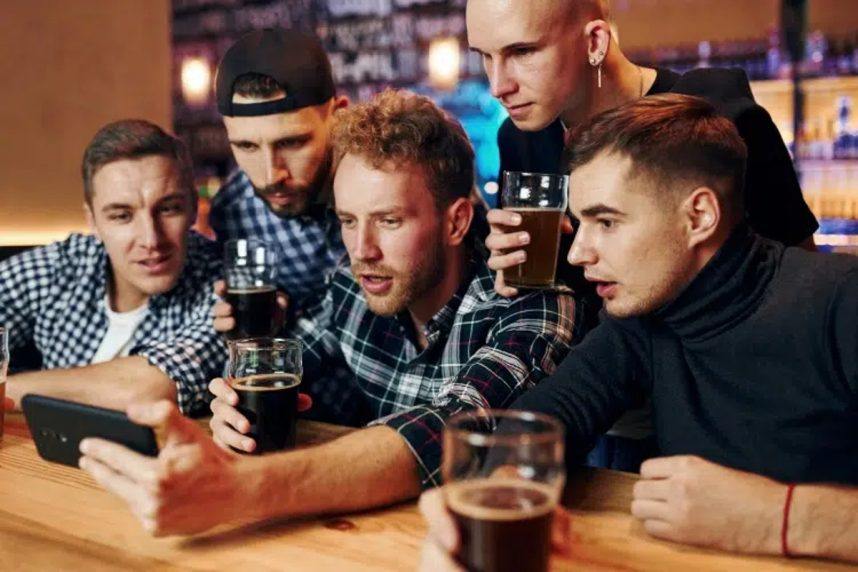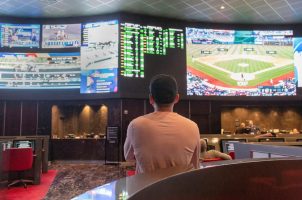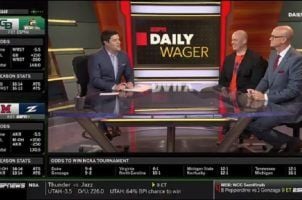Sports Bettors More Likely to Binge Drink, UNLV Study Concludes
Posted on: April 4, 2024, 07:41h.
Last updated on: April 4, 2024, 09:48h.
Many sports bettors aren’t only risking money when they gamble, but possibly their health, too. That’s according to new research conducted by the University of Nevada, Las Vegas (UNLV) in conjunction with the University of New Mexico.

The report, “Double Trouble: The Risks of Mixing Alcohol and Sports Wagering,” concluded that sports bettors are nearly two times as likely to binge drink than nonsports bettors. The study included esports and fantasy sports players in the sports bettor segment.
Our study suggests that sports bettors appear to use alcohol in particularly risky ways,” said study co-author Shane Kraus, a professor of psychology who serves as director of the UNLV Behavioral Addictions Lab. “Therefore, more education is needed to inform people about the possible risks of heavy alcohol use while also wagering on sports.”
The study surveyed more than 4,300 adults across the United States. About 3,300 reported consuming alcohol within the past year, and 1,800 said they participated in sports gambling.
Poll Takeaways
Researchers determined that sports bettors who drink were “at least” 1.9 times more likely to report excessive drinking, defined as five or more drinks for men and four or more drinks for women in a single session. Binge drinking increased as gambling frequency rose.
The findings, researchers say, demonstrate additional evidence that sports bettors and gamblers are more prone to risk-taking, and that risk-taking often leads to dangerous health habits like binge drinking.
The US Centers for Disease Control and Prevention estimates that one in six adults binge drink, with 25% doing so regularly, or weekly. Many people who binge drink, the federal health agency says, aren’t dependent on alcohol. However, such excessive alcohol consumption “is harmful on its own.”
The CDC says binge drinking can lead to chronic diseases such as high blood pressure, stroke, heart disease, and liver disease. Certain cancer risks are also elevated by binge drinking, including liver, colon, rectum, mouth, pharynx, larynx, esophagus, and breast cancer.
Binge drinkers are at heightened risk for sexually transmitted diseases because of risky sex, as well as violence such as homicide, suicide, partner abuse, and sexual assault.
The UNLV/University of New Mexico survey found increased rates of binge drinking among both male and female bettors. The researchers concluded that there’s “an immense need” for ongoing research, “particularly to examine how novel gambling technologies influence the prevalence, presentation, and prevention of alcohol use disorders and related harms.”
Rapid Market Expansion
Once confined to Nevada, bookies, and illegal offshore websites, sports betting in the US has become part of mainstream culture since the Supreme Court struck down the federal sports gambling ban in May 2018.
Before the landmark ruling, only Nevada offered betting on single-game outcomes. Other states such as Delaware had sports betting, but only parlay options that involved combining several bets into one were allowed.
Over the past six years, sports wagering has become accessible to most individuals in the U.S. via mobile applications or websites,” the study explained. “Increasing evidence suggests that sports wagering is associated with greater substance use and misuse, particularly alcohol, and symptoms of alcohol use disorder.”
Today, there are 38 states, plus Washington, DC that allow sports betting. Thirty-one of those jurisdictions include online sports betting.
Related News Articles
Former Texas Governor’s Sports Betting Estimates Contain Hyperbole, Say Experts
US Sports Betting Growth Propelled by Young, High-Income White Males – Poll
ESPN Donates $200K to UNLV Gaming Institute for Sports Betting Media Analysis
Sports Betting a Growing Problem Facing College Students
Most Popular
Casinos That Were Never Casinos
Most Commented
-
End of the Line for Las Vegas Monorail
— April 5, 2024 — 90 Comments -
Mega Millions Reportedly Mulling Substantial Ticket Price Increase
— April 16, 2024 — 9 Comments -
Long Island Casino Opponents Love New York Licensing Delays
— March 27, 2024 — 5 Comments
















Last Comment ( 1 )
When you lose it affects your whole system. I'm on a wicked losing streak myself but I'm not upset. I consider myself a value better. Mix futures in your regular bets.